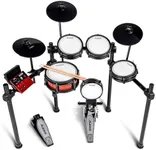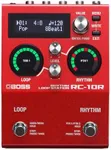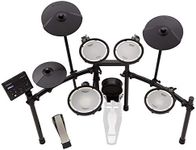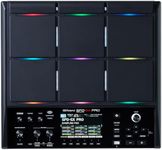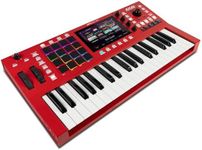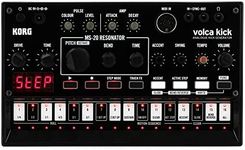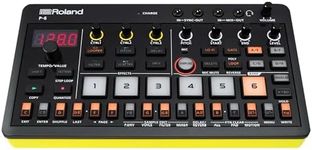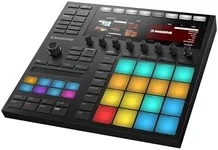Buying Guide for the Best Drum Machines
Choosing the right drum machine can significantly enhance your music production experience. Drum machines are electronic instruments designed to imitate the sound of drums and other percussion instruments. They are widely used in various music genres, from electronic dance music to hip-hop and rock. When selecting a drum machine, it's essential to consider your musical style, production needs, and the features that will best support your creative process.Sound QualitySound quality refers to the clarity, richness, and authenticity of the drum sounds produced by the machine. High-quality sound is crucial for professional music production as it ensures your tracks sound polished and engaging. Drum machines can vary from producing basic synthetic sounds to highly realistic drum samples. If you are looking for a more authentic drum sound, opt for a machine with high-quality samples and advanced sound processing capabilities. For electronic music, synthetic sounds might be more suitable.
Number of SoundsThe number of sounds a drum machine can produce is important for versatility in music production. This includes different drum kits, percussion instruments, and effects. A machine with a wide range of sounds allows you to experiment and create diverse tracks. If you are a beginner, a drum machine with a basic set of sounds might be sufficient. However, if you are an advanced producer, you might prefer a machine with an extensive library of sounds to expand your creative possibilities.
Sequencing CapabilitiesSequencing capabilities refer to the drum machine's ability to arrange and program drum patterns. This feature is essential for creating complex rhythms and beats. Drum machines can offer simple step sequencing or more advanced options like real-time recording and pattern chaining. If you are new to drum machines, a basic step sequencer might be easier to use. For more experienced users, advanced sequencing features can provide greater control and flexibility in your music production.
ConnectivityConnectivity options determine how well the drum machine integrates with other equipment, such as computers, MIDI controllers, and audio interfaces. Good connectivity is important for expanding your setup and enhancing your workflow. Look for drum machines with USB, MIDI, and audio outputs to ensure compatibility with your existing gear. If you plan to use the drum machine in a live performance or studio setting, robust connectivity options are essential.
Ease of UseEase of use refers to how user-friendly the drum machine is, including its interface and controls. A machine that is easy to navigate can significantly improve your workflow and creativity. Drum machines can range from simple, intuitive designs to complex interfaces with numerous features. If you are a beginner, look for a machine with straightforward controls and clear instructions. Advanced users might prefer a machine with more features and customization options, even if it requires a steeper learning curve.
PortabilityPortability is important if you plan to use your drum machine in different locations, such as live performances or collaborative sessions. Portable drum machines are typically compact and lightweight, making them easy to transport. If you need a drum machine for studio use only, portability might be less of a concern. However, if you are a traveling musician or frequently collaborate with others, a portable drum machine can be very convenient.


